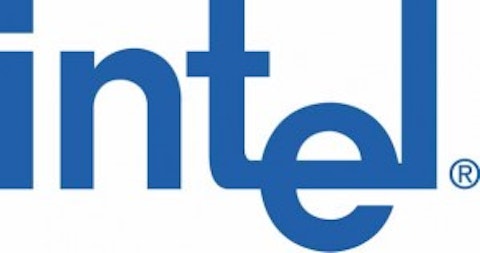
Into the quarter
In the most recent quarter, Intel Corporation (NASDAQ:INTC) reported net income of $2 billion compared to $2.7 billion for the same period last year. Its revenue for the quarter fell 2% to $12.6 billion. The company’s revenue from the PC business declined 6% to $8 billion due to a decline in the consignment of PCs across the world. Its data center business that is comprised of server processors posted a gain of 7.5%.
Indirect benefit
Intel Corporation (NASDAQ:INTC) has been late in creating its own chips in the tablet market, but still it has a lot to be happy about. Intel believes that 122 tablets or 600 smartphones generate sufficient web traffic to absorb a server. This means sales of the company’s servers are allied to the sales of smartphones and tablets.
Worldwide, smartphone and tablet shipments are increasing every quarter. Intel estimates that it approximately has 90% market share in the server business. This means that the company’s server revenue should rise by a couple billion dollars in the next year even if we assume the shipments of smartphones and tablets remain the same as the current year.
Moreover, by 2014, Intel will be better placed in mobile computing as its transistor fabrication process will be reduced to 14-nanometers, while its competitors are expected to be producing transistor fabrications at 20-nanometer technology. Intel’s structural design should further prove energy efficient giving it an upper hand over competition.
The hard truth
Intel might have the consolation prize of being a dominant name in the server segment of the market, but its real victory will come by getting its foothold in the tablet and smartphone markets. Intel’s efforts to penetrate the mobile space have been met with varied results, as its Ultrabook has been disappointing. The company is presently counting on its new 22 nanometer mobile chip that is planned to enter the market soon.
Intel Corporation (NASDAQ:INTC) has always been dominant in whatever it does, and the company is moving ahead with its focus on mobile. Its R&D budget, which is projected at around $19 billion in fiscal 2013, places it in a better position than its other competitors trying to enter the mobile segment of the market.
Further, Intel needs a reasonable amount of leverage against QUALCOMM, Inc. (NASDAQ:QCOM) to thrust margins higher, which might require it to lacerate its prices.
Intel’s late response in the mobile-chip market has already given QUALCOMM, Inc. (NASDAQ:QCOM) an upper hand. QUALCOMM, Inc. (NASDAQ:QCOM)’s chips currently hold up scores of smartphone and tablet devices with an 86% share of the LTE modem market. In short it simply holds the same position as Intel does in the PC space.
The company has many patents in its name that makes the flow of revenue more or less certain. QUALCOMM, Inc. (NASDAQ:QCOM)’s Snapdragon processor will be used in Google Inc (NASDAQ:GOOG)‘s Nexus 7 tablet, giving the company a base to expand in the challenging tablet market.
QUALCOMM, Inc. (NASDAQ:QCOM)’s quarterly earnings growth is 36% currently, and it is expected to surge almost 15% a year for the coming five years. It has been able to maintain its significance in the mobile-chips market, which might help it come out as a better player in the semiconductor sector. This can occur as mobile devices and tablets might eventually take share from the PC market.
Another semiconductor play
Advanced Micro Devices, Inc. (NYSE:AMD) is another player that has lost a lot of business because of the decline in PC sales as it’s a chip-producing company for traditional PCs. Its revenue recently fell 21%. Its gross margins fell from 44.8% in 2011 to 22.8% in 2012.
The company looks in bad shape but deals with Microsoft Corporation (NASDAQ:MSFT),Nintendo and Sony should help it to produce steady sales over the next couple of years.
Moreover, Advanced Micro Devices, Inc. (NYSE:AMD) is trying a complete turnaround and its management is working hard for it. It has by now fashioned for itself a reputation of excellent quality and infiltrating innovations in its products. It’s offering is being used in many computers and will further be used more extensively in game consoles in the future.
Presently, Advanced Micro Devices, Inc. (NYSE:AMD) holds in excess of 4,650 patents, and based on company information, most of the major PC providers across the globe rely on AMD’s work.
AMD’s latest technological advancements give investors numerous reasons to be optimistic about the stock. The company’s TurboDock technology that automatically toggles power based on user convention is predicted to be a new trend in mobile computing. It might combine the needs of both tablet users and computer users. In short, a lot is in store for both customers and investors.
Final words
Intel Corporation (NASDAQ:INTC) is a household name and there is no denying this fact. With its outstanding fundamentals and cash balance of $18 billion, the company is well able to finance its capex and dividends. It is spending significantly in its future, and as Intel Corporation (NASDAQ:INTC) has a history of being a market leader in what it does, I have many reasons to believe that the company’s efforts should pay off.
In short, Intel is a good investment for patient long-term investors who can wait a couple of years for the company’s strategies to start delivering. Until then, sit back and enjoy the dividends, which are currently yielding 4.3%.
The article How to Profit From Shifting Trends for Semiconductor Stocks originally appeared on Fool.com and is written by tarun bachhawat.
Copyright © 1995 – 2013 The Motley Fool, LLC. All rights reserved. The Motley Fool has a disclosure policy.

